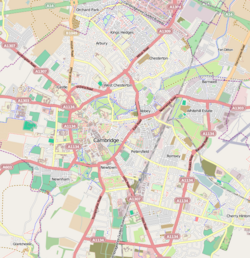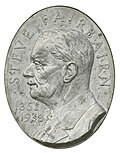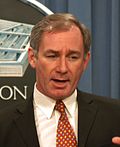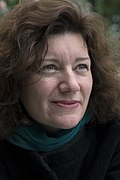Top Qs
Timeline
Chat
Perspective
Jesus College, Cambridge
Constituent college of the University of Cambridge, England From Wikipedia, the free encyclopedia
Remove ads
Jesus College is a constituent college of the University of Cambridge.[a] Jesus College was established in 1496[5] on the site of the twelfth-century Benedictine nunnery of St Mary and St Radegund by John Alcock, then Bishop of Ely.[5] The cockerel is the symbol of Jesus College, after the surname of its founder. For the 300 years from 1560 to 1860, Jesus College was primarily a training college for Church of England clergy.[6]
Jesus College has assets of approximately £375m making it Cambridge's seventh-wealthiest college.[7] The college is known for its particularly expansive grounds which include its sporting fields and for its proximity to its boathouse. Three members of Jesus College have each received a Nobel Prize.[8] Two fellows of the college have been appointed to the International Court of Justice.[9]
Sonita Alleyne was elected master of Jesus College in 2019, 40 years after the college began admitting women as students.[10] She is also the first black leader of an Oxbridge college.[11]
Remove ads
History
When founded in 1496, the college consisted of buildings taken over from the Nunnery of St Mary and St Radegund, which was founded at the beginning of the 12th century. The chapel is the oldest university building in Cambridge still in use and predates the foundation of the college by 350 years; it also predates the university by half a century.
The Benedictine Convent, upon dissolution, included the chapel and the cloister attached to it; the nuns' refectory, which became the college hall; and the former lodging of the prioress, which became the Master's Lodge. This set of buildings remains the core of the college to this day and this accounts for its distinctly monastic architectural style, which sets it apart from other Cambridge colleges. A library was soon added, and the chapel was considerably modified and reduced in scale by Alcock. At its foundation, the college had a master, six fellows and six scholars.[12]
Remove ads
Academic profile
Jesus College admits undergraduate and graduate students to all subjects at the university though typically accepts a larger number of students for engineering, medicine, law, natural sciences, mathematics, economics, history, languages, and human, social and political sciences.[13] The college offers a wide range of scholarships.[14]
The college consistently performs well in the informal Tompkins Table, which ranks Cambridge colleges by undergraduate results. Along with students from Trinity, King's, Christ's and St John's, students of the college have been members of the Cambridge Apostles.
Remove ads
Buildings and grounds
Summarize
Perspective

Entrance
The main entrance to Jesus College is a walled passage known as the "Chimney". The term is derived from the Middle French word cheminée, for "little path" or "little way". The Chimney leads directly to the Porter's Lodge and then into First Court. All the courts at the college, except for the cloister, are open on at least one side.
Libraries
Quincentenary Library

The Quincentenary Library is the main library of Jesus College and is open 24 hours a day. The library was designed by Eldred Evans and David Shalev in commemoration of the 500th anniversary of the foundation of the college in 1996. Completion of the library was shortly followed by a new accommodation building in 2000, now known as Library Court.[15] The Quincentenary Library has a particularly large law collection, housed in a law library on the ground floor.
Old Library
The Old Library was in regular use until 1912. It still contains over 9,000 books and is available to private researchers upon appointment.[16] The Old Library includes the Malthus Collection, being the family collection of alumnus Thomas Malthus, famous for his study An Essay on the Principle of Population which influenced Charles Darwin.
College grounds
Jesus College has large sporting grounds on-site. These include football, rugby, cricket, tennis, squash, basketball and hockey pitches. The Jesus College Boat House is 400 yards away, across Midsummer Common.[17]
The college frequently hosts exhibitions of sculpture by contemporary artists. It has hosted work by Sir Antony Gormley, Sir Eduardo Paolozzi, and Barry Flanagan.[18] The college grounds also include a nature trail, inspired by poetry composed by Samuel Taylor Coleridge during his time as a student.[19]
Jesus College is one of the few colleges to allow anyone to walk on the lawns of its courts, except First Court, Cloister Court and those that are burial sites for nuns from the original nunnery.
A major addition to the College – the largest in modern times – is the West Court development, which was officially opened in October 2017 by HRH the Earl of Wessex. Its facilities include a 180-seat lecture theatre, medical teaching suite, guest and conference accommodation, a café bar, research space and student social areas.[20]
The development is built on part of the site of Wesley House, the freehold of which had previously belonged to the College and was returned to it in 2014.[21]
Remove ads
Chapel and choir
Summarize
Perspective

Chapel

The College Chapel was founded in 1157 and took until 1245 to complete, and is believed to be the oldest university building in Cambridge still in use. Originally it was the chapel of the Benedictine Convent of St. Mary and St. Radegund, which was dissolved by Bishop John Alcock.
The original structure of the chapel was cruciform in shape and the nave had both north and south aisles. A high, pitched roof was surmounted by a belfry and steeple; this collapsed in 1277. The chapel was also used as the parish church of St Radegund. Twice the chapel was ravaged by fire, in 1313 and 1376.
When the college took over the precincts during the 15th century, the parish was renamed after the college as Jesus parish, with the churchyard still being used for burials. This was short-lived, as by the middle of the 16th century Jesus' parish was absorbed into that of All Saints. Significant alterations were carried out to the church under Alcock, transforming the cathedral-sized church, which was the largest in Cambridge into a College chapel for a small group of scholars. A large part of the original nave was replaced by College rooms, and subsequently part of the Master's Lodge.
The misericords were created by the architect Augustus Pugin between 1849 and 1853. Pugin used fragments of the misericords dating from 1500, which had been preserved in the Master's Lodge as templates. Repairs were also undertaken by George Frederick Bodley between 1864 and 1867, who commissioned decorative schemes from Morris, Marshall, Faulkner & Co.[22] The same firm returned in the 1870s to install stained glass.[23]
Said and sung services are held every day during term. Choral Evensong takes place four times a week (Tuesdays, Thursdays, Saturdays, and Sundays), and sung Eucharist on Sunday mornings. There are also Compline twice a term, as well as Masses on major holy days.[24] The chapel, famed for its warm but clean acoustics, is also a much sought-after space for concerts and recitals, as well as recordings.

Choir
Jesus College maintains two choirs, the College Choir and the Chapel Choir.[25]
- The College Choir consists of male and female students and sings regular services twice a week in the chapel. One of the leading choirs in Cambridge, its singers are mainly drawn from the college's students but also include singers from other colleges. Evensong is sung by the College Choir on Tuesdays at 6.30 pm and Sundays at 6.00 pm during Full Term; Sunday Eucharists are sung by a consort of singers from the College Choir.
- The Chapel Choir, which is likely to have existed since the foundation of the college, consists of around 20 younger choristers combined with the lower voices of the College Choir and also sings services twice a week in the chapel. It is unique among Cambridge college choirs in that the choristers are volunteers: that is, they are drawn from schools around the city and do not attend a particular choir school. The Chapel Choir sings Evensong on Thursdays and Saturdays at 6.30 pm.[26]
Between September 2009 and December 2016 Mark Williams, former assistant organist at St Paul's Cathedral, served as director of music,[27] being succeeded by Richard Pinel, former assistant organist at St George's Chapel, Windsor and Organ Scholar at Magdalen College, Oxford, in January 2017.[28] After Pinel's departure at the end of the 2022 academic year, Peter Wright served as acting director until the appointment of the current director Benjamin Sheen, who took up the post in January 2023. Former Organ Scholars who have held or currently hold director of music posts at British cathedrals include Malcolm Archer (Bristol Cathedral, Wells Cathedral and St Paul’s Cathedral), Geraint Bowen (St Davids Cathedral and Hereford Cathedral), Charles Harrison (Chichester Cathedral), Peter Hurford (St Albans Cathedral), Richard Lloyd (Hereford Cathedral and Durham Cathedral) and James O'Donnell, (Westminster Cathedral and Westminster Abbey.[29]
Remove ads
Student life
Summarize
Perspective

Student societies
Jesus College has two active student unions, the Jesus College Student Union (JCSU) and the Jesus College Graduate Union (MCR). These unions organise a wide range of social, cultural, welfare and sporting events throughout the year. The John Hughes Arts Festival, founded by College students in 2014 in memory of the late Dean of Chapel, John Hughes, enters its third year in 2017, providing a broad programme of arts events.[30]
Sport
Jesus College offers sports, including rowing, football, rugby, hockey, tennis, squash and basketball. The college typically fields several teams in each sport. The Jesus College Boat Club is particularly strong, with the 1st Men's VIII never having dropped below 12th place in the May Bumps and 11th position in the Lent Bumps. The JCBC organises the annual Fairbairn Cup Races.[citation needed]
Hall
A three-course dinner known as Formal Hall is served in the college's main dining hall five nights a week. Gowns are worn by all members of the college, along with lounge suits for men and formal dresses for women. A four-course dinner for graduate students of the college known as Grad Hall is served in Upper Hall each Wednesday. Unlike most traditional Oxbridge colleges, the college allows graduate students to dine at High Table on Tuesdays.
The college offers informal dining at lunch and dinner known as Caff, as well as brunch on Saturday mornings and a brunch on Sundays. The college has a student bar known as JBar.[34]
Remove ads
Masters and fellows
Summarize
Perspective
Masters
Sonita Alleyne was elected master of the college in 2019. She was preceded by Ian White, former Van Eck Professor of Engineering at the university. Previous masters of the college include:
- Robert Mair (2001–2011), former Sir Kirby Laing Professor of Civil Engineering at the university;
- David Crighton (1997–2000), former Professor of Applied Mathematics at the university;
- Baron Renfrew of Kaimsthorn (1986–1996), former Disney Professor of Archaeology at the university;
- Sir Alan Cottrell (1973–1986), former Goldsmiths' Professor of Materials Science and later Chief Scientific Adviser to the Prime Minister; and
- Sir Denys Page (1959–1973), former Regius Professor of Greek and President of the British Academy.
Fellows
Three members of the college have received Nobel Prizes. Philip W. Anderson was awarded the Nobel Prize in Physics (1977).[35] Anderson was a fellow from 1969 to 1975 while he held a visiting professorship at the Cavendish Laboratory and has been an Honorary Fellow since 1978. Peter D. Mitchell, an undergraduate and later research student, was awarded the Nobel Prize in Chemistry (1978). He became an Honorary Fellow in 1979.[36] Eric Maskin was a joint winner of the Nobel Prize in Economics in 2007. Maskin was a research fellow from 1976 to 1977 and has been an Honorary Fellow since 2009.
Several prominent figures in the law have been fellows of the college. Glanville Williams, a scholar of criminal law,[37] was a Fellow from 1957 to 1978. The Glanville Williams Society, consisting of current and former members of Jesus College, meets annually in his honour.[38] David Hayton, editor of Underhill and Hayton's Law of Trusts and Trustees and current judge of the Caribbean Court of Justice was a Fellow from 1973 to 1987.[39] Robert Yewdall Jennings was a Fellow of the college and later Whewell Professor of International Law (1955–1982) before his appointment to the International Court of Justice (ICJ), where he served as a Judge (1982–1991) and later as President (1991–1995). James Crawford was also a Fellow of the college and later Whewhell Professor of International Law (1992–2014) before his appointment to the International Court of Justice in November 2014. Current Honorary Fellows include Roger Toulson, Lord Toulson of the Supreme Court of the United Kingdom, Sir Rupert Jackson of the Court of Appeal, and Sir Colman Treacy, also of the Court of Appeal, all of whom were students of the college.[40]
Honorary fellows include Dame Sandra Dawson; Sir Anthony Gormley; Anthony Gubbay; Sir David Hare; Martin Rees, Baron Rees of Ludlow; Colin Renfrew, Baron Renfrew of Kaimsthorn; Robin Renwick, Baron Renwick of Clifton; Sir Bernard Silverman; Richard Tuck; and Alan Watson, Baron Watson of Richmond.[citation needed]
Remove ads
Notable alumni
This article's list of alumni may not follow Wikipedia's verifiability policy. (May 2019) |
- John Bale, controversial historian, playwright and Bishop of Ossory.
- Richard Bancroft, Archbishop of Canterbury, chief overseer of the production of the King James Bible.
- Fulke Greville, 1st Baron Brooke, Elizabethan poet, dramatist and statesman.
- John Flamsteed, the English astronomer and first Astronomer Royal.
- Thomas Herring, Archbishop of Canterbury, noted Whig and Hanoverian supporter.
- Laurence Sterne, Irish novelist and Anglican clergyman.
- Steve Fairbairn, Australian rower and influential rowing coach.
- Alistair Cooke, British/American journalist.
- Andrew Mitchell, Conservative MP.
- Nick Hornby, English novelist, author of About a Boy.
- Grace Chatto, member of the band Clean Bandit, who were all educated at the college.
- Thomas Cranmer, the first Protestant Archbishop of Canterbury, responsible for the Book of Common Prayer, attended the college from 1503, at the age of fourteen.
- Robert Malthus, British scholar, philosopher, economist and population theorist, was admitted to the college in 1784, and elected a Fellow in 1793.
- The English poet and Romantic, Samuel Taylor Coleridge.
- Prince Edward, Duke of Edinburgh, the fourth and youngest child of Queen Elizabeth II.
Remove ads
See also
- List of organ scholars at British Universities
- Okukor, a Benin bronze
- Tobias Rustat
Notes
References
External links
Wikiwand - on
Seamless Wikipedia browsing. On steroids.
Remove ads






















